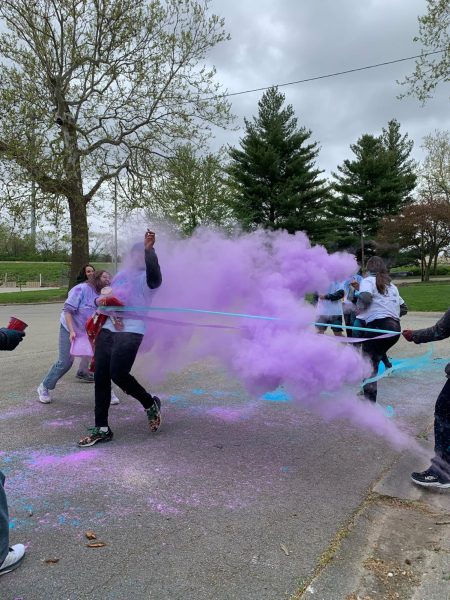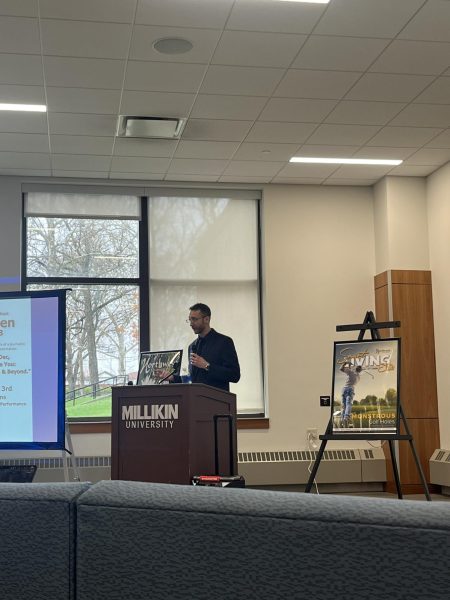Hispanic Heritage Month Dialog
To provide an opportunity for discussion on various topics, Director of Student Inclusion Molly Berry created The Dialog Lunch Series. It occurs on a monthly basis, and this month, it’s all about celebrating Hispanic Heritage Month.
Students, faculty, and staff will have the opportunity to engage in conversations on different topics important in society today. To celebrate Hispanic Heritage Month here on campus, which occurs from Sept. 15 through Oct. 15, Berry has invited all of Millikin to participate in multiple events happening in the upcoming weeks.
First up was a Dialog Lunch Series. It took place on Thursday, Sept. 15 at 12 p.m. in the Lindsay Schaub room. The topic for the day was how Latinos/Hispanics have been impacted due to the rhetoric in this presidential race.
Different articles were scattered across the room to help people gain better insight as to how this current U.S. political climate is impacting the Latino and Hispanic voters. People were encouraged to read through an article and then pass that article along for others to read, as well. This program was put on “to provide an opportunity to talk about pressing issues in [our] society and community.”
What do we know about our current political climate? The sentiment in the room was that this current political climate is one fraught with negativity, fear mongering, and stereotypical undertones. In this current political season, we have “candidates fighting over the latino vote” and “derogatory comments and an overuse of stereotypes and sweeping generalizations especially in the primaries.”
One attendee mentioned that there is a pretty negative rhetoric happening using fear mongering to persuade voters to cast their vote for certain candidates by using the tactic of labeling certain groups of people as “bad guys,” i.e. “the association of Muslims as terrorists/ Mexicans as rapists and murders.”
Unfortunately, this is an all too real image that is supported and touted about in social and political settings. For example, nearly everyone by now has heard or seen Donald Trump champion his idea to halt immigration between the U.S. and Mexico, commonly referred to as “The Wall.” This proposal symbolizes and conjures up an image that they’re [Mexicans] the problem and we need a physical barrier to keep them out. It also represents fear and money, and it points to an “us versus them” type of sentiment.
On one hand, there is the constant negative stereotyping and generalizations of a specific group of people, and on the other, there are candidates pandering almost to a fault to their constituents. Certain candidates classify issues as “Hispanic/Latino” issues (such as the most popular hot button issue, immigration) just so they can pat themselves on the back for addressing said issues.
Interestingly enough, Hispanic voters have the same concerns as other voters. They aren’t a rare token for someone to gain and wear like a badge of honor. Their beliefs are values-based; however, candidates have made it easy to gain their vote when they marginalize them. This notion to “label issues as latino issues is a part of the nation’s political construct,” and maybe they can get the latino vote just by talking about immigration.
This tactic of using buzzwords creates an image and becomes a popular way to draw voters in. The media sees candidates bringing up “latino issues,” so they play their role of reporting on “latino issues.”
One female attendee said, “I appreciate it [pandering], but it is being brought about in a very weird way.”
This sentiment is echoed by another with the following statement: “Your concern for them [Hispanic voters] is that their votes equal victory, but their is no real concern for them to actually care what they actually think. It’s not authentic.
“It’s just empty promises with popular culture references. For example, Hillary Clinton declaring she always carries hot sauce in her bag and Donald Trump celebrating Cinco de Mayo with a taco bowl. These were done in an attempt to target a certain audience, but this pandering wound up missing the mark and indirectly turning off the very intended audience it attempted to gain. Yet, the irony is, with this pandering, you’ve caught our attention, so now keep it.”
Voting in the upcoming election will truly depend on the connection you feel to your values and the authenticity you receive from the candidates. Your vote matters, and your vote has an impact: don’t forget that. You have the power to vote for whoever you feel can do the job right and has your best interest at heart.











